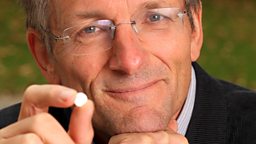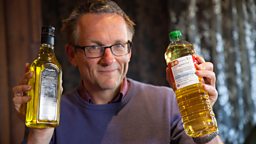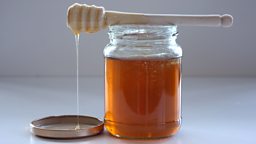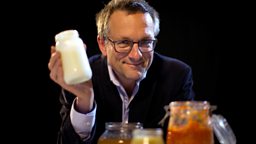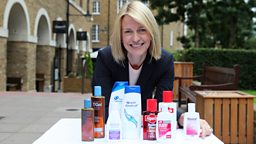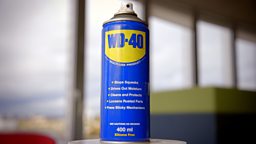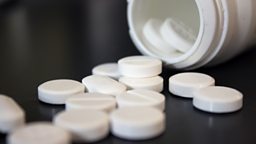How much is too much alcohol?
Michael Mosley investigates the evidence behind some of the claims we hear about in the media. Are some things really ‘all bad’ or ‘all good’?
This time, Michael talks to two leading experts who have different opinions on how much is too much when it comes to alcohol.
What’s the debate?
We often hear that red wine is good for us – and occasionally beers and other alcoholic drinks make the same claim.
But is it true, and if it is, is it to do with the alcohol, or other compounds in the drinks? This is an area of real disagreement.
The current recommended daily intake of alcohol for both men and women in the UK is 14 units of alcohol over a week – spread over 3 or more days.
This translates to 7 pints of weak beer or small glasses of wine, but alcohol levels and serving sizes of drinks vary so much it can mean as little as 4 bottles of strong lager or large glasses of wine.
There is a large body of evidence to suggest that drinking at this level is safe – and in some cases could even offer protection against heart disease.
But there is also controversy around this research, suggesting that the studies are flawed, and there is good research showing that any amount of alcohol puts you at increased risk of some cancers.
Related Links
Papers
(Ann Epidemiol 2007)
Kaye Middleton Fillmore, PHD, Tim Stockwell, PHD, Tanya Chikritzhs, PHD, Alan Bostrom, PHD, and William Kerr, PHD
(J Natl Cancer Inst 2009)
Naomi E. Allen , Valerie Beral , Delphine Casabonne , Sau Wan Kan , Gillian K. Reeves , Anna Brown , Jane Green ; on behalf of the Million Women Study Collaborators
(BMJ)
Paul E Ronksley, doctoral student, Susan E Brien, post-doctoral fellow, Barbara J Turner, professor of medicine and director, Kenneth J Mukamal, associate professor of medicine, William A Ghali, scientific director and professor
(STRESS) Alexander Jones, Merlin R. McMillan, Russell W. Jones, Grzegorz T. Kowalik, Jennifer A. Steeden,Jens C. Pruessner, Andrew M. Taylor, John E. Deanfield, and Vivek Muthurangu
Interview
Dr Alexander Jones is a consultant cardiologist at Great Ormond Street Hospital and UCH, and a clinical scientist at UCL. He believes that there is a safe level of alcohol consumption, in line with the current guidelines. And that there is substantial evidence that moderate drinking can offer protection against heart disease. He says:

“There are large prospective studies in many thousands of people in different parts of the world, that show that if you drink modest amounts of alcohol, up to say two, to three units of alcohol a day, that you, are less likely to develop coronary heart disease or stroke later on in life.”
His own work, in which he took MRI images of people doing a frustrating task, showed that those who were regular moderate alcohol drinkers had less strain on their cardiovascular system when under that kind of emotional pressure than those who never drank, or who normally drank a lot.
Interview
Professor Tim Stockwell is Director of the Centre for Addiction Research at the University of Victoria in Canada. He thinks that the studies suggesting a protective effect of alcohol are just too good to be true. He says:

“I think it's important that we take a sceptical look at the evidence because, there's a lot of bad science out there...”
He points out that a lot of the big studies comparing abstainers with moderate drinkers are comparing two groups of people who are not the same: that within the ‘abstainer’ category you often get people who have given up alcohol for health reasons, and also a disproportionate number of people from a poorer background who tend to have poorer health. When he has looked at studies which control for these biases, he says that the supposed protective effects of alcohol disappear.
He thinks that there is little evidence of a genuine benefit of alcohol, and yet there is plenty of evidence that it increases the risk of many types of cancer – that with no alcohol in the world there would be 10% fewer cases of breast cancer, and that if a man drinks the current UK guidelines, he increases his risk of prostate cancer by 23%. He thinks that people should judge how much they want to drink based on a sound understanding and knowledge of the risks.
